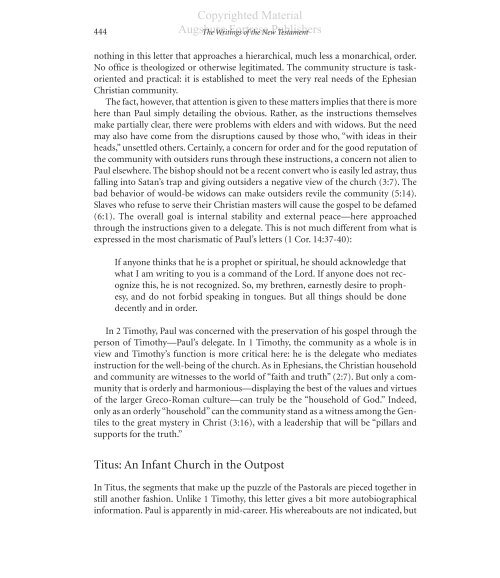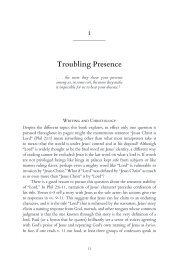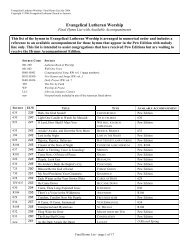19. Pastoral Letters: 1 Timothy, 2 Timothy, Titus - Augsburg Fortress
19. Pastoral Letters: 1 Timothy, 2 Timothy, Titus - Augsburg Fortress
19. Pastoral Letters: 1 Timothy, 2 Timothy, Titus - Augsburg Fortress
You also want an ePaper? Increase the reach of your titles
YUMPU automatically turns print PDFs into web optimized ePapers that Google loves.
444<br />
Copyrighted Material<br />
<strong>Augsburg</strong> <strong>Fortress</strong> Publishers<br />
The Writings of the New Testament<br />
nothing in this letter that approaches a hierarchical, much less a monarchical, order.<br />
No office is theologized or otherwise legitimated. The community structure is taskoriented<br />
and practical: it is established to meet the very real needs of the Ephesian<br />
Christian community.<br />
The fact, however, that attention is given to these matters implies that there is more<br />
here than Paul simply detailing the obvious. Rather, as the instructions themselves<br />
make partially clear, there were problems with elders and with widows. But the need<br />
may also have come from the disruptions caused by those who, “with ideas in their<br />
heads,” unsettled others. Certainly, a concern for order and for the good reputation of<br />
the community with outsiders runs through these instructions, a concern not alien to<br />
Paul elsewhere. The bishop should not be a recent convert who is easily led astray, thus<br />
falling into Satan’s trap and giving outsiders a negative view of the church (3:7). The<br />
bad behavior of would-be widows can make outsiders revile the community (5:14).<br />
Slaves who refuse to serve their Christian masters will cause the gospel to be defamed<br />
(6:1). The overall goal is internal stability and external peace—here approached<br />
through the instructions given to a delegate. This is not much different from what is<br />
expressed in the most charismatic of Paul’s letters (1 Cor. 14:37-40):<br />
If anyone thinks that he is a prophet or spiritual, he should acknowledge that<br />
what I am writing to you is a command of the Lord. If anyone does not recognize<br />
this, he is not recognized. So, my brethren, earnestly desire to prophesy,<br />
and do not forbid speaking in tongues. But all things should be done<br />
decently and in order.<br />
In 2 <strong>Timothy</strong>, Paul was concerned with the preservation of his gospel through the<br />
person of <strong>Timothy</strong>—Paul’s delegate. In 1 <strong>Timothy</strong>, the community as a whole is in<br />
view and <strong>Timothy</strong>’s function is more critical here: he is the delegate who mediates<br />
instruction for the well-being of the church. As in Ephesians, the Christian household<br />
and community are witnesses to the world of “faith and truth” (2:7). But only a community<br />
that is orderly and harmonious—displaying the best of the values and virtues<br />
of the larger Greco-Roman culture—can truly be the “household of God.” Indeed,<br />
only as an orderly “household” can the community stand as a witness among the Gentiles<br />
to the great mystery in Christ (3:16), with a leadership that will be “pillars and<br />
supports for the truth.”<br />
<strong>Titus</strong>: An Infant Church in the Outpost<br />
In <strong>Titus</strong>, the segments that make up the puzzle of the <strong>Pastoral</strong>s are pieced together in<br />
still another fashion. Unlike 1 <strong>Timothy</strong>, this letter gives a bit more autobiographical<br />
information. Paul is apparently in mid-career. His whereabouts are not indicated, but




